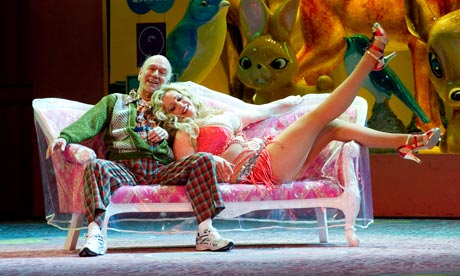This year, the Philadelphia Orchestra filed for bankruptcy, as did the Lyric Opera of San Diego, canceling the remainder of their season. Elsewhere, Minnesota Orchestra posted the largest deficit in the company's history. In Detroit, the Symphony Orchestra ended a year marred by a six-month musicians strike with a $1.8 million deficit, as well. The Dallas Symphony Orchestra posted deficits for the year of near $4 million. Musicians of the Utah Symphony orchestra have agreed to take pay cuts amounting to over $1 million over the next three years to keep the company going.
And, in New York, the City Opera has dealt with its money troubles by taking the show on the road, leaving Lincoln Center for a set of performances that will span the city, a deeply contentious decision that is still reverberating through the community, as talks between unions and the opera stall. Despite the gloom and doom in the air, however, 2011 also saw a resurgence of interest in "classical" forms, with a number of pop artists trying their hands at composing operas and a pair of festivals celebrating the bustling range of contemporary music.
Though some relegate classical music to the senior citizens and the fur-clad aristos of a former age, 2011 also showed us the political urgency and social ferment that such music can provoke. Demonstrators took over Lincoln Center to listen to Philip Glass -- not his music, but his words. A WikiLeaks opera is in the works, and, by the time it comes out, you may be able to livestream it onto your laptop. For a form that's often considered stagnant, 2011 was anything but. As some walls fall, others go up in their stead. And all the while, music plays.
Read on for our list of the 11 biggest moments in classical music in 2011:
City Opera's Hard Year
The New York City Opera is having a hard year. Let's summarize: After planning to instate Gerard Mortier at the head of a revamped, modern-minded new City Opera, failure to muster the asked-for budget left the company in a bind, as renovations led to a
minimized season for 2008-2009. Ticket sales fell, donations dwindled. George Steel, formerly of the Miller Theater and briefly of Dallas Opera, was appointed in 2009. In 2011, the "people's opera" announced it would
leave Lincoln Center, its home for more than 40 years, due to the expense, despite a rising chorus of detractors (including singer Placido Domingo)
exhorting the company to rethink the decision. The
position of music director was eliminated, the vocal coach, director of artistic planning and several others quit, and, over the last year, reduced administrative staff by
42 percent.
Several board members have also departed. Now, with a sharply reduced season of four productions approaching, the roving company faces even more problems, as talks with unions -- Local 802 of the American Federation of Musicians and the American Guild of Musical Artists -- flounder. A
mediator has since been called in to help reach an agreement, but the future is uncertain.
The Brooklyn Philharmonic Takes To The Road
Meanwhile, in Brooklyn, the Philharmonic bounced back from the financial difficulties that led the company to cancel their 2009-2010 season to plan an unusual season under the
new leadership of Alan Pierson, formerly of music ensemble Alarm Will Sound. The Philharmonic, founded in 1857, no longer has the home at the Brooklyn Academy of Music it once did -- instead, a new season takes the orchestra through the different boroughs of Brooklyn, with music inspired by, performed by and about the borough it takes its name from. With performances by musicians like Mos Def, and music by Brooklyn greats like Copland and Gershwin, this slim, mobile incarnation of the Brooklyn Phil could be a positive light for the similarly plagued City Opera to take heart in.
James Levine Puts Down The Baton
The modern era of the Metropolitan Opera has been defined by James Levine, who made his debut conducting in 1971, became its principal conductor in 1973, and in 1986 stepped into the newly created role of artistic director. After more than 2,500 performances, he announced in September that he would step aside as principal conductor,
ceding the position to Fabio Luisi, and in December,
withdrew from conducting any performance until at least 2013. Levine, a noted interpreter of works by heavyweights like Wagner and Mozart, also brought lesser seen pieces like Hector Berlioz's "Le Troyens," and Alban Berg's "Wozzeck" into the spotlight during his tenure at the Met. Known for his grueling work schedule (till last March, Levine also held the artistic directorship at the Boston Symphony Orchestra), Levine has, for all of recent memory, shaped the Met's musical direction.
Frank Gehry's Miami Music Hall
Against the blue skies, tall palms and golden beaches of Miami rises a massive white structure -- New World Symphony's new
Frank Gehry-designed $160 million concert hall. The New World Symphony was created in 1987 as a place for just-graduated musicians to hone their skills, but the new hall, which seats 756, has been designed with the public in mind. You don't have to be a concertgoer to appreciate the building, which will allow for live feeds to be projected onto the sides so that visitors can set up in the park and watch for free. The structure itself maintains a sense of openness and expansiveness meant to bring the audience more intimately in touch with the musicians, and to open up the musicians to the public.
A Man, An Ape, An Opera: New Shostakovich Discovered
Dmitri Shostakovich died 36 years ago. But this winter, one of his lost operas made its
world premiere in Los Angeles at the Walt Disney Concert Hall, conducted by Esa Pekka Salonen. Discovered seven years ago in a dusty cardboard box in Moscow, "Orango," tells a curious tale inspired by actual mad Russian scientist Ilya Ivanov, who tried to breed apes and people together. "Orango" is the name of the central character, also called "Jean Or," an anti-communist newspaper magnate and man-ape whose bad deeds cause him to degenerate back into a monkey in a cage. Like much of Shostakovich's work, "Orango" likely survives through a mixture of fortune, and the determination of others -- a friend of the composer made a habit of bribing Shostakovich's maid to bring him the papers in Shostakovich's trash.
Occupy Classical Music
As Occupy Wall Street took hold in Zuccotti Park, offshoots of the movement dedicated to, among other things, protesting economic injustice, American greed and consumerism, and financial inefficiency, took aim at New York's high cultural centers. Occupy Museums, which began by targeting art museums and their corporate backers, led to
Occupy Lincoln Center -- where composer
Philip Glass, on the night of a performance of his own opera "Satyagraha," about Gandhi and the power of peaceful resistance, roused a raucous crowd to think more carefully about the growing sense of dissatisfaction in the country.
Liszt Turns 200
While alive, Franz Liszt was something like a modern day Justin Bieber: Women would scream, cry and even faint when he appeared, Byronically-coiffed, darkly romantic, and fiercely gifted on the piano. "Lisztomania" isn't just a song by Phoenix. For his 200th, performances, celebrations, and reappraisals greeted this proto-rock god. Though his prowess as a performer has gone unchallenged, as a composer, Liszt has suffered in stature. Though he's credited with inventing the orchestral tone poem, he's perhaps best remembered for a body of devilishly difficult piano pieces, including transcriptions of other works as well as his own, surprisingly experimental, original songs.
Opera's New Pop CredThough few browsing the crowd at a Saturday night performance at the Met would consider the attendees to be the first word in cool, in 2011, opera got its baptism in cool. Karen O, of the Yeah Yeah Yeahs, presented her '
psycho opera,' "Stop the Virgens," this fall at St. Ann's Warehouse in Brooklyn, a hallucinogenic tale about a group of virgins. This July, Damon Albarn, of pop groups Blur and Gorillaz, turned in "Dr Dee," an eclectic tale about a medieval era English alchemist. And soon, Rufus Wainwright, who, unlike Albarn and O has always proclaimed his allegiance to the music and the culture of operatic tradition, will open City Opera's 2011-2012 season with "
Prima Donna," a story about one day in the life of an opera singer.
9/11 Remembered
Instead of silence, classical music remembered the anniversary of September 11 with commissions, concerts, and other commemorations to mark the day. At the San Francisco Opera, Christopher Theofanidis' new opera "Heart of a Soldier," told the story of Rick Rescorla, who led 2,700 people to safety on September 11, before re-entering the World Trade Center for a final check -- and dying there. In Steve Reich's piece "WTC 9/11," performed by the Kronos Quartet, string instruments intermingle with pre-recorded voices including first responders and NORAD air traffic controllers for an intensely sad, rhythmic and anxious piece. And John Corigliano responded with "One Sweet Morning," a mezzo-soprano song cycle set to four poems representing the horror of war, and a prayer for piece.
Instant Opera, In Your Bed
The Metropolitan Opera began their
Live in HD streaming program five years ago, allowing people either outside of New York, or unable to attend the ability to see full-length operas live for low costs. That program is still going strong, but in 2011, we also saw the possibility for an even easier, accessible, and instantaneous way to bring people into the opera house -- the internet. The
Guardian, along with the Glyndebourne Festival, gave anyone with a web connection the ability to see both Benjamin Britten's "
The Turn of the Screw" and Richard Wagner's "Die Meistersinger von Nurnberg" for free and in full by livestreaming the production. The
Guardian provided listening guides and behind-the-scenes information for those listeners who might just be getting into the game. Though classical music is often pegged as behind the times, this step towards harnessing the immensely democratizing power of the web could foretell a future where anyone can participate in an art form frequently maligned as "elitist."
Let's Throw A Festival!
This year, two festivals -- The Ecstatic Music Festival (in its second year) and the SONiC festival (in its first) -- championed new, contemporary music. The Ecstatic called it "post-classical," while SONiC limited itself to composers under the age of 40 (including musicians like Jonny Greenwood, The National and Aphex Twin alongside composers like Nico Muhly, Judd Greenstein).
Rather than buy into the fatalist attitudes that seem to dominate classical programming, these festivals chose instead to celebrate the vibrant, eclectic, and very much living landscape that contemporary composers represent.








The Huffington Post Amy Lee First Posted: 12/23/11 09:38 AM ET Updated: 12/23/11 05:37 PM ET